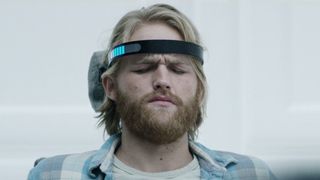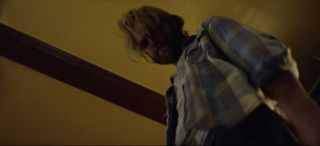Black Mirror’s ‘Playtest’ episode is exactly the videogame horror story your October needs
Just how far will we go to scare the crap out of ourselves?

Here’s another hour for your October spooks quota: episode two of Black Mirror season three, titled ‘Playtest,’ which premiered on Netflix a couple days ago. It’s an augmented reality horror story that wonders how far off we are from having bad technological trips worse than drug-induced ones. Like, say, being assaulted by human-headed spiders.
If you’re unfamiliar, Black Mirror is the brainchild of Charlie Brooker, and its three seasons are filled with 40-to-70 minute long standalone episodes about every awful thing technology is going to do to us in the future. The show can be a bit on-the-nose with its warnings—seek out hypothetical technological horrors and they’re easy to find—though I can’t say Brooker’s wrong to be terrified by Silicon Valley’s recklessness. And it is refreshing to watch a show more frightened of smartphones than it is of videogames. Playtest actually handles gaming pretty well, even if the augmented reality game at its center is possibly evil.
The real villain of Playtest is dramatic irony, which you’ll expect if you’ve watched any other episode of Black Mirror. The protagonist, well-meaning dumbass Cooper, is a 20-something American who’s in London on the last leg of a backpacking trip through Asia and Europe, where he ran off to after his father’s death. He refuses to answer his presumably worried mother’s calls, and is instead running his life like a game on his phone, finding hookups via a Tinder-like app, doing work for a Taskrabbit-esque service, taking selfies everywhere he goes. He’s losing track of his honest self, treating his dad’s death with rehearsed lines like it’s a note in his D&D character’s backstory—so of course it’s an actual videogame that confronts him with reality.

When Cooper’s bank account is drained by an identity thief and he can’t afford a flight home, he’s urged by last night’s hook-up, Sonja—who happens to work in the videogame industry—to take a job testing a mysterious new game from a famous horror auteur. While it quickly leaps into sci-fi neural interfaces, the videogame stuff is refreshingly grounded. Or, at least, it isn’t condescending or stupid, as we’ve come to expect from TV. Sonja is portrayed as a well-off professional (though way too well-off if she’s meant to be in the games press), while Cooper is a pretty standard casual game player. At one point, Sonja holds up a copy of our own Edge magazine featuring a cover that was created by our colleagues for the show. When Cooper makes it to the game studio to take part in the test, it looks like an exaggerated version of real open floorplan studios I’ve been to. Being guided past keycard-locked doors into demo rooms is plenty familiar.
The auteur game designer has big ideas about horror—how we “glow” after confronting our fears in a safe environment—which pretty well mimics the big talk of some real designers I’ve met. He may even be more believable than Kojima or Molyneux.

The familiarity ends there, though, because no one has ever shot an implant into my neck—which is too bad, because I’d be down for it. The idea is that they’ve implanted a device in Cooper’s brain stem that’s going to read his mind and manifest his deepest fears as sounds and visions overlaid on the real world. It’s an augmented reality game meant to terrify the hell out of you until you tap out. All Cooper has to do is hang out in a creepy mansion for a while, and yell his safeword when he can’t take it anymore.
The ‘butterfly dreaming he’s a man’ thing, where we’re all still in the Matrix or Inception’s dreamscape, may be a modern sci-fi cliche, but Playtest’s reality layers are just opaque enough that I couldn’t quite make out which way it was going to twist, and actor Wyatt Russell is startlingly convincing as the bold idiot who agreed to this test. I also enjoyed Brooker’s knowing nods to horror like Existenz (in that they share a premise), BioShock, and The Mezzotint—not pandering, but appreciative and fun.
The biggest gaming news, reviews and hardware deals
Keep up to date with the most important stories and the best deals, as picked by the PC Gamer team.

I groaned (in a pleased, knee-slappy way) at the Big Irony of it, but taking the concepts at face value and ignoring the morality tale, Playtest’s augmented reality game is an unsettling future we’re already on the cusp of confronting. I don’t think games are going to read our minds or anything, but virtual and augmented reality horror will only get more lifelike from here. Right now, even with a bulky HTC Vive on my head, I can already be shot with adrenaline from a jump scare. With my vision and hearing overtaken by the machine, there’s no looking away, and even if I can sense the screen in front of me, on some level my brain is trying to accept the virtual space as real.
20 more years of AR and VR development will produce experiences that are many times harder to distinguish from reality (recall that 20 years ago Quake had amazing graphics), and I don’t think the fascination with horror will diminish. It’s a challenge, like jumping out of planes at greater and greater altitudes, or ordering the spiciest thing on the menu because it’s somehow going to impress everyone at the table (doubtful). We’ll be dared to walk around our own houses while a virtual ghoul slams doors and squeaks floorboards and appears in our mirrors—or probably something much worse I haven’t thought of. I already get freaked out after watching a horror flick at night alone, little sounds becoming louder, darkness seeming deeper, so I can’t imagine how I’d sleep after hijacking my own senses with a horror AR game. Is there a line where virtual reality becomes dangerous, and will we stop when we find it? I’m going to have to guess: yes, and definitely no.

Tyler grew up in Silicon Valley during the '80s and '90s, playing games like Zork and Arkanoid on early PCs. He was later captivated by Myst, SimCity, Civilization, Command & Conquer, all the shooters they call "boomer shooters" now, and PS1 classic Bushido Blade (that's right: he had Bleem!). Tyler joined PC Gamer in 2011, and today he's focused on the site's news coverage. His hobbies include amateur boxing and adding to his 1,200-plus hours in Rocket League.
Most Popular




